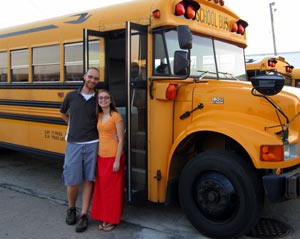 It’s 5:00 a.m. and PTS student Eric Vinsel’s morning alarm blares. Stumbling out of bed, he spends the next 15 minutes regretting his decision to drive a school bus, longing for just a few more moments of sleep. He peddles from his home to where his school bus is parked. By about 9:00 a.m., he’s finished his morning route and hustles to Imago Dei, a non-denominational church plant in Peoria, Ill., to work five hours before returning for his afternoon bus route.
It’s 5:00 a.m. and PTS student Eric Vinsel’s morning alarm blares. Stumbling out of bed, he spends the next 15 minutes regretting his decision to drive a school bus, longing for just a few more moments of sleep. He peddles from his home to where his school bus is parked. By about 9:00 a.m., he’s finished his morning route and hustles to Imago Dei, a non-denominational church plant in Peoria, Ill., to work five hours before returning for his afternoon bus route.
Eric, an M.Div. student, is completing the Seminary’s church planting emphasis and his year-long internship is a program requirement. “It’s also an opportunity to test out many of the ideas I have swirling around about how to best engage poverty,” says Eric. “These experiences will help me to hone my vision for the future and give me real world experience that can harness by creativity.”
His primary responsibilities at the church are to work with the youth and to run the church’s homeless ministry. Every Sunday morning the burgeoning church serves between 80 and 100 homeless individuals a hot meal. Homelessness is something that Eric knows personally. In recent years, he rode a 1975 Honda motorcycle from Chicago to the Mexico-California border, up the West Coast to the northern tip of Alaska, touched the Arctic Ocean in Prudhoe Bay, and then came back across Canada before returning to Chicago. From there, he abandoned the bike and hopped in a canoe where he paddled from his home in a Chicago suburb down a series of small rivers to the Mississippi River. Eric was hit by a barge in Chester, Ill., and walked from Chester to Memphis, Tenn., before winter. He then took a bus to New Orleans, La., where he lived as a homeless person for several months before he began to intern at the homeless shelter for six months. On the various trips, Eric worked for a motorcycle tow truck company in California, served on a Mormon cattle ranch in Utah installing barbed wire fences, stayed on a hippie commune in Colorado, and even worked on a shrimp boat out of Grand Isle and a brewery in New Orleans.
Throughout all of these adventures, Eric stayed with a different family almost every night and lived with almost every sort of community imaginable. When he was on the side of the road in need of help, Eric says the church never came. Christian men and women with their fish medallions on their vehicles never pulled over, offered a meal, or helped. “But, anytime I saw a VW van I knew the driver was going to pull over and give me some food and make sure I got where I needed to go. My notion of good and evil has shifted so that piety is no longer defined by reading the Bible and declaring one’s faith with cute logos, but instead is defined by love and hospitality. What would a church look like that acted more like VW van driving hippies?”
Based on this question, Eric wants to “do church” differently. “It’s not because what we are doing is wrong, but because people connect differently. We need church services as they are now to continue to meet the needs of those who do connect through sermons and songs. My passion and calling, however, is to engage those that don’t.”
Eric’s internship is unpaid and he therefore relies on a scholarship from the Omaha Seminary Foundation as well as his bus driving job to support himself and his new wife, Jenny who is finishing her final year at Bradley University.
Written September 2012
